


Photography BA(Hons) (Online)
Create compelling images that effect positive, global change.
Course overview
With a distinct focus on visual storytelling, this online photography degree will equip you with the skills to become an agile and ethical multimedia content creator.
Taught by practicing academic staff as part of Falmouth’s renowned Institute of Photography, you’ll join a global online community of bold and progressive image-makers working to promote social and sustainable change.
By the time you graduate, you will have a professional-standard portfolio of meaningful images, an industry-ready skillset and the ability to inspire and motivate through creative, purposeful work.
Why study this course at Falmouth?
- Refine your technical skills and master emerging technologies through engaging online workshops
- Join a growing global community of ambitious photographers
- Build relationships with working practitioners who are shaping the photography industry
- Collaborate on international projects and help to define the role photography plays in today’s media landscape
Top image credits L-R: Cody Murray, Alex Mighall, Henning von Jagow
Course details
Through active engagement with online workshops, you will develop technical photographic skills in response to the challenges of the industry, learning to fuse experimental and professional approaches to photography. You will be supported and encouraged to experiment, take risks, and produce innovative and unique work.
By sharpening your research, analysis and collaboration skills - and with the ability to work from anywhere in the world - this online degree will prepare you for a global career in photography and visual communication; from producing multimedia content for social justice campaigns to working on cutting-edge freelance projects.
Hear from Dr Catarina Fontoura, Course Leader on our Photography BA(Hons) (Online) degree. We speak to Catarina about her passion for photography and how the online course has built a positive community to enrich each student's practice.
Course study options
On this accelerated online Photography degree, you’ll have the opportunity to gain a BA(Hons) degree over two years full-time or three years part-time.
From module information to course aims and assessment criteria, discover the full course details:
Through practical and critical enquiry, you will be supported to disrupt, experiment and question creative processes. This initial stage of the course requires courage to test, and curiosity to explore. You will be joining an immersive community culture, collectively growing skills, embracing innovation and encouraging creative endeavour.
Through live briefs, and online workshops and recorded learning content, you will be introduced to a range of creative processes, from critical thinking to practical hands-on skills across different photographic mediums. You will also begin to engage with a wider industry context, preparing you for the future workplace.
Modules
Explore
You will immerse yourself in the course from week one, building a community and laying the foundations for a long-lasting creative practice.
You will also begin to explore the medium through experimentation with a range of photographic approaches and post-production techniques.
Source
This investigative module aims to build your professional collaboration and research skills, helping you to develop important industry awareness at an early stage in your studies, preparing you for a range of careers in the creative industries.
In Source you will work with peers and people in your own community to gather collective intelligence and find creative responses to shared questions.
Make
This photographic practice module develops your image making and post-production skills and refines your use of materials, processes, and techniques.
You will be invited to explore the world around you, bringing together storytelling and process and finding exciting ways to make images using film, digital or alternative processes.
Reflect
This module focusses on your critical thinking skills, and how you use research and image analysis to better understand the context of photographs. We will explore what it means to ‘create for good’ and consider our responsibilities as creatives.
Through the lens of sustainability and change, you will explore how your own and others’ images can communicate impactfully.
Advancing and deepening your technical skills, you will experiment and begin to specialise in certain areas of photographic practice by exploring responses to set briefs. You will have opportunities to collaborate with others on your course and industry partners, to produce ambitious group projects using online platforms.
You will grow an awareness of audience, refining your practical and critical research skills, project management, and your knowledge of contemporary photography, history and theory. As you progress through this stage, you will begin to develop your own self-initiated projects and collaborations. As more industry-facing experiences begin to be introduced, you will be challenged to question convention, disrupt, innovate and maintain courageous thinking.
Modules
Define
This module aims to develop your ability to shape ideas and photographic outcomes, and to interrogate ethical and sustainable approaches to your practice.
You will be working on a brief for a non-profit organisation or sustainable business, using your skills to help advance key narratives and ideas.
Audience
Practicing a range of research methods, you will develop a group response to contemporary issues, exploring social, ethical, and environmental situations.
In this module you will also reflect upon professional work culture to build a collective learning environment which can generate ideas and visual possibilities.
Engaging with the concept of ‘Audience’ you will be analysing and re-imagining the impact of photographs and creative outputs in promoting positive change.
Innovate
Applying the knowledge and skills you have developed so far, and supported by your learning community, this self-directed practice module will harness your ability to generate innovative photographic responses to a variety of challenges, underpinned by your developing critical voice.
Collaboration
Working as part of a team, you'll work on 'Challenge Briefs' that reflect the sort of assignments you could expect to be working on in industry. Developing your 'soft skills', like communication, problem-solving, critical thinking and leadership, you'll sharpen your ability to work well as part of a group to produce outstanding work.
This module is a collaboration with Falmouth’s other online courses including interior design, illustration, visual communication, creative writing and more. You will therefore have an opportunity to widen your professional network and collaborate with people in different creative fields.
The stage supports you to refine your photographic approach and to challenge your emerging fields of interest, culminating in a final portfolio of work and a contextual report that grounds your work. You will refine core skills and reflect critically on your strengths, exploring alternative models of practice that help define your creative future beyond the course.
Modules
Develop
This module is designed to enable you to develop your professional identity ahead of your Final Major Project. You will evolve and refine a specialist body of creative, innovative work and identify a future career pathway in the creative industries.
Futures
This industry module aims to situate your practice and prepare you with the skills needed for a successful and dynamic career in the creative industries.
You will receive practical and technical advice about a diverse range of creative industry roles, from experienced industry practitioners.
You will define what success means to you and approach the values and mission you want to take with you after you graduate.
Launch
In your Final Major Project, you will develop an innovative final photographic portfolio that demonstrates a high level of professionalism and industry level finish, appropriate for your career ambitions.
Frame
This module requires you to write a report contextualising your work within the broader industry and identifying future audiences for your practice.
We regularly review course and module content to ensure our students receive a high-quality and rewarding academic experience. As such, there may be changes made to the curriculum which are not immediately reflected in the content displayed on our website. Optional modules may be updated to maintain the best experience. Any students or applicants affected will be informed of approved changes directly.

Got questions about the course, funding or online study?
Your Course Advisor Tamsin is here to help.
Our students and graduates
Meet our online Photography community

"The opportunity to learn from experienced tutors, while connecting with a global community of students, felt like the perfect environment to develop my skills and grow as a photographer."
Holly Parsons, current student

"I'm able to work around my existing commitments. Being a mature student and having responsibilities, such as mortgage and job, means I can study in my spare time and when it suits me."
Jon Pemberton, current student

"The course has helped me gain a deeper understanding of the artistic aspects of photography and the importance of having a strong concept and narrative behind my work."
Cody Jai Murray, current student
Stories from our community
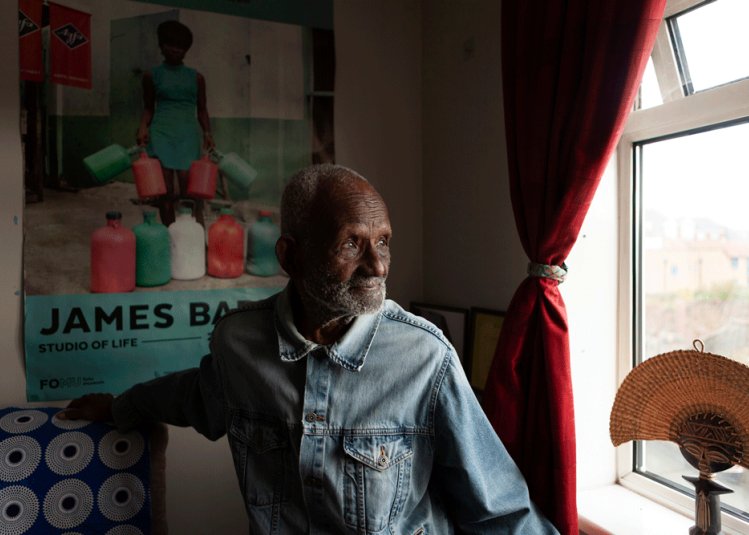
Photography lecturer shoots editorial commission for The New York Times
11 February 2026
BA(Hons) Photography (Online) lecturer, Celine Marchbank, has recently captured the 96-year-old Ghan...
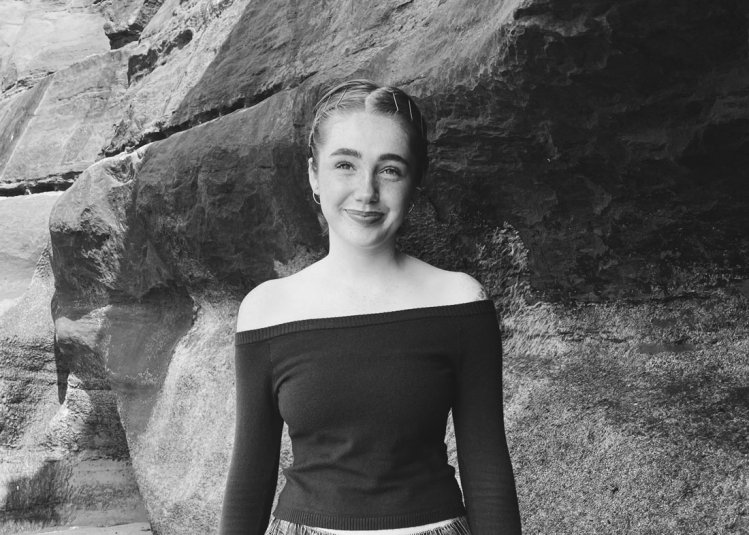
Falmouth graduate wins Portrait of Britain for second year running
10 February 2026
Niamh Shergold discusses the story behind her winning image.
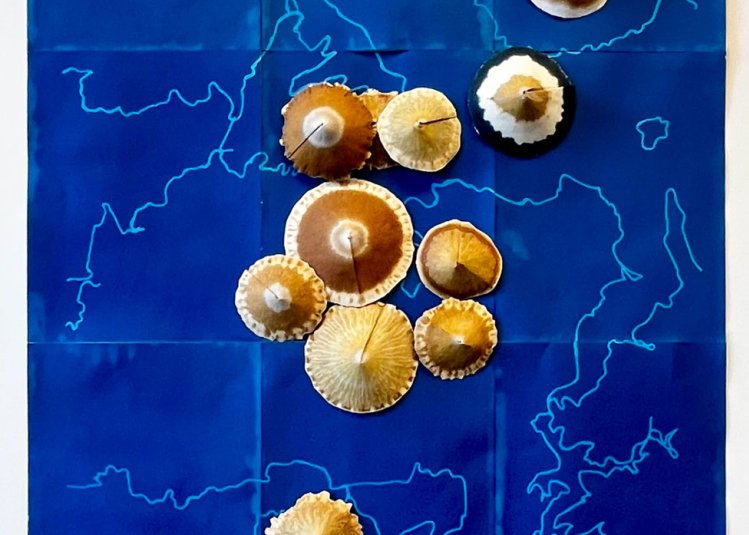
'Volcanic Field Map' by Linda Jarrett.
How an MA Photography project sparked change in emergency planning
05 February 2026
Linda Jarrett discusses her final major project on Auckland's volcanic risk.
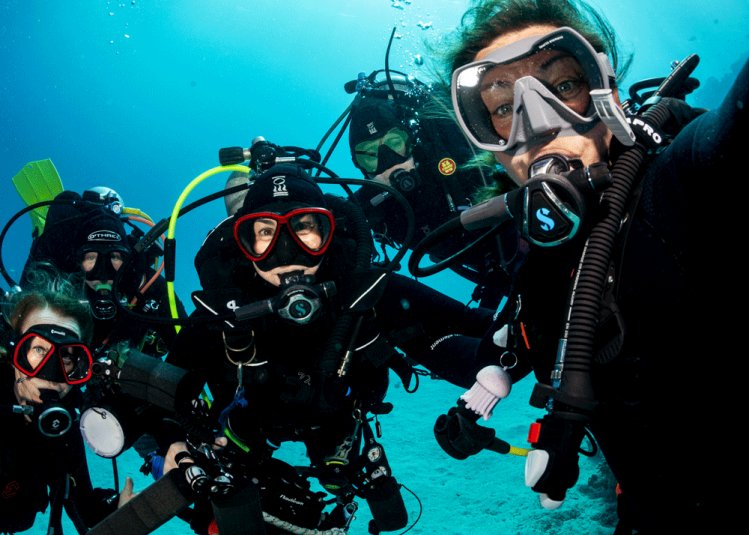
Photography students capture fascinating marine life in Egypt on annual diving trip
03 February 2026
BA(Hons) Marine & Natural History Photography students recently got the chance to dive into the Red ...

Credit: William Bunce
Still life photographer on fusing creativity with technical excellence
13 January 2026
Since graduating from Falmouth’s BA(Hons) Photography degree in 2010, William Bunce has forged a s...
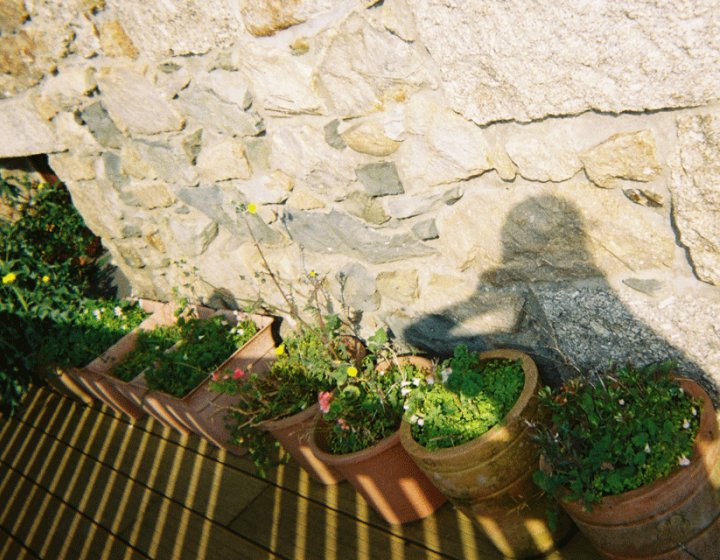
Falmouth lecturers collaborate with West Cornwall Women’s Aid to facilitate exhibition in Penzance
24 November 2025
Unsettled is an upcoming exhibition that showcases the strength and resilience of women rebuilding t...
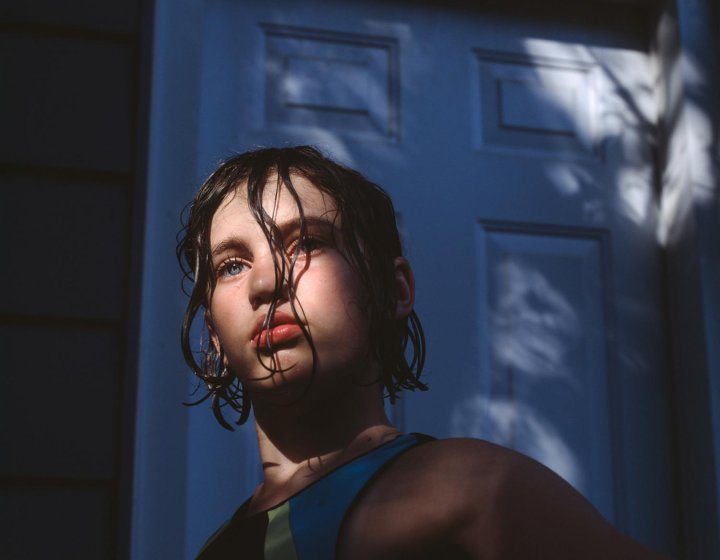
From the series 'All Quiet on the Home Front' by Colin Pantall
Falmouth Photography Lecturer explores fatherhood in Italian exhibition
20 October 2025
Colin Pantall's exhibition, 'All Quiet on the Home Front' explores fatherhood, landscape and identit...
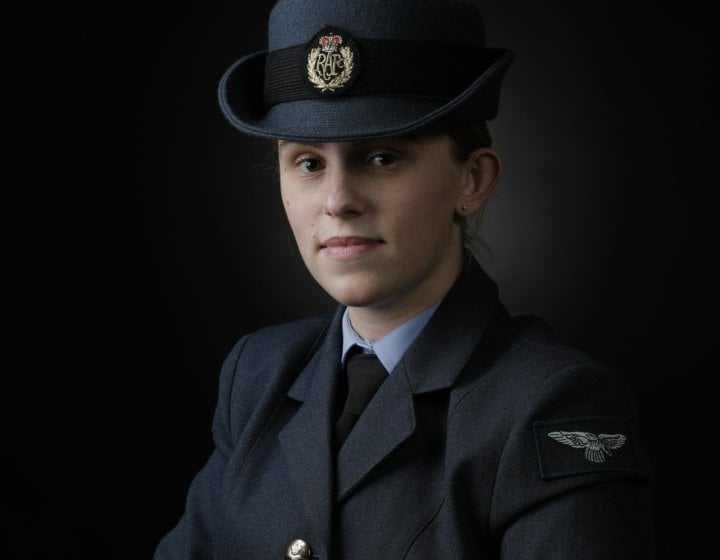
RAF Photographer on balancing military service with a master’s degree
03 October 2025
Read how Leah Jones combined military deployment with a master's degree.
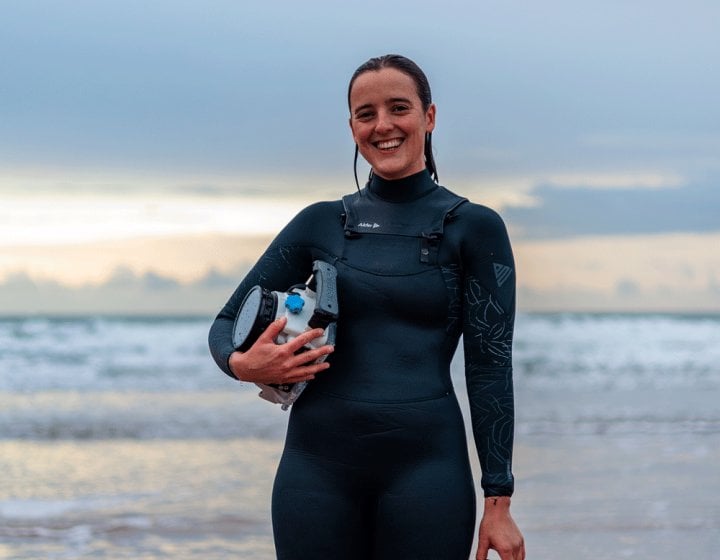
Falmouth alumna becomes the first female editor of long-standing surf magazine
23 September 2025
After feeling creatively influenced by Falmouth’s deep connection with the sea, nature and its com...
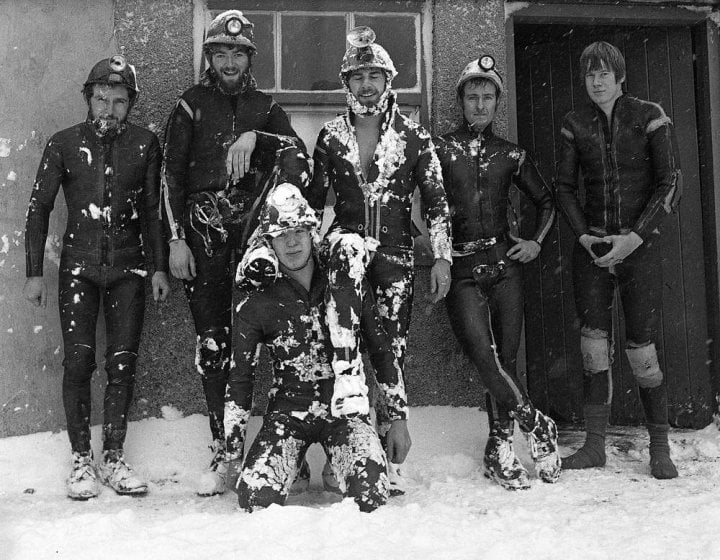
Eldon Pothole Club at Peakshill Farm, 1971
Falmouth student documents the eccentric world of Derbyshire cavers
31 July 2025
Specialising in portrait photography, Jon has turned his lens on the Eldon Pothole Club.
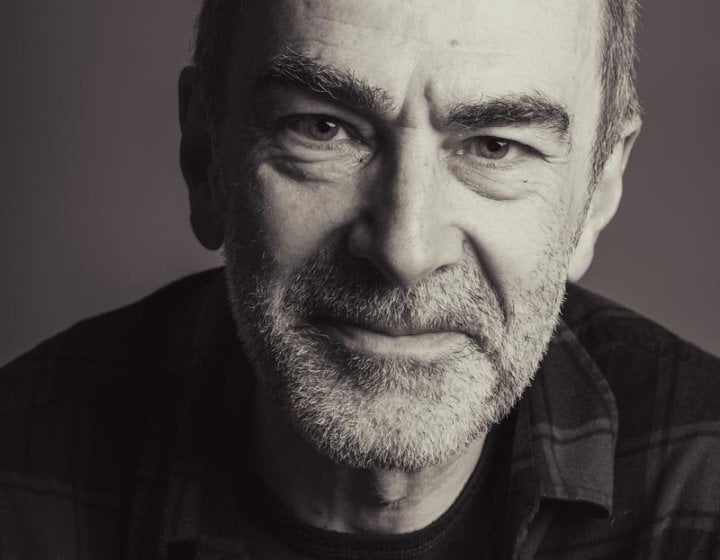
Image by Seamus Flanagan
How postgraduate study gave one mature student a new focus
22 July 2025
Will shares how he rediscovered his creative voice through returning to higher education later in li...

Work by Cody Murray
Photography student secures multiple commissions in the haircare industry
26 June 2025
Cody Murray has recently worked with haircare brand WAHL and bagged an editorial feature in Tribu-te...
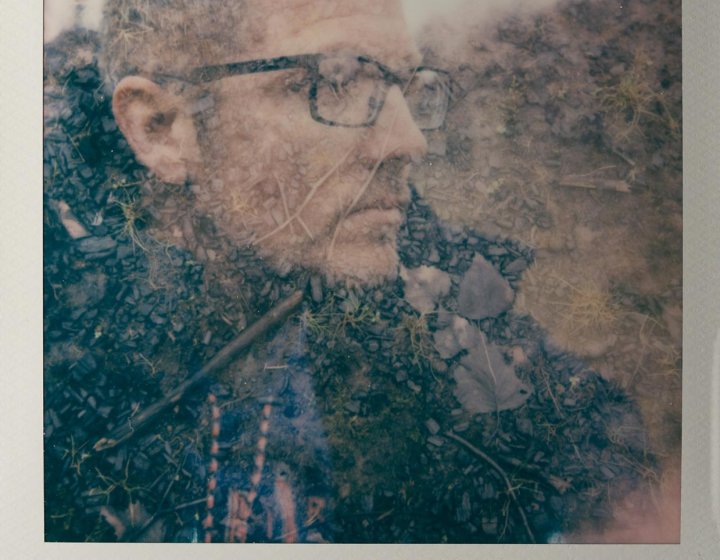
Work by Dean Cook
Exploring neurodiversity through Polaroid photography
25 June 2025
Read how one Photography student used his course to explore a deeply personal project.
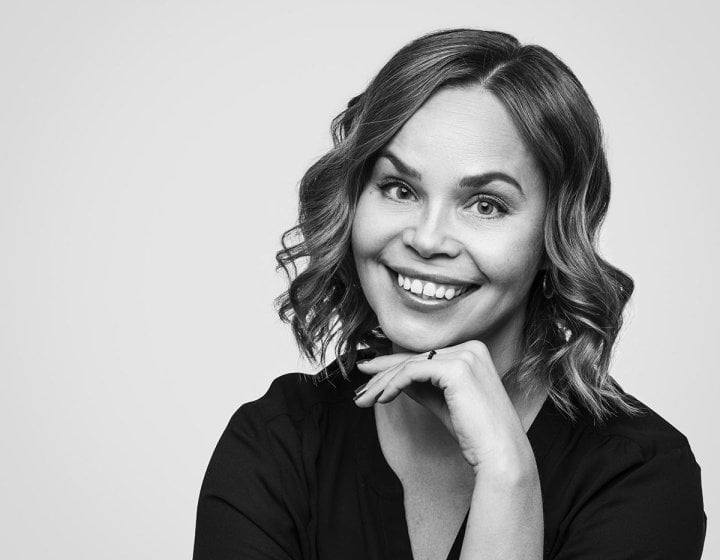
Graduate shortlisted for Photo London x Hahnemühle Student Award
13 May 2025
Photography MA (Online) graduate, Nina Kostamo Deschamps is already making her mark in the field.
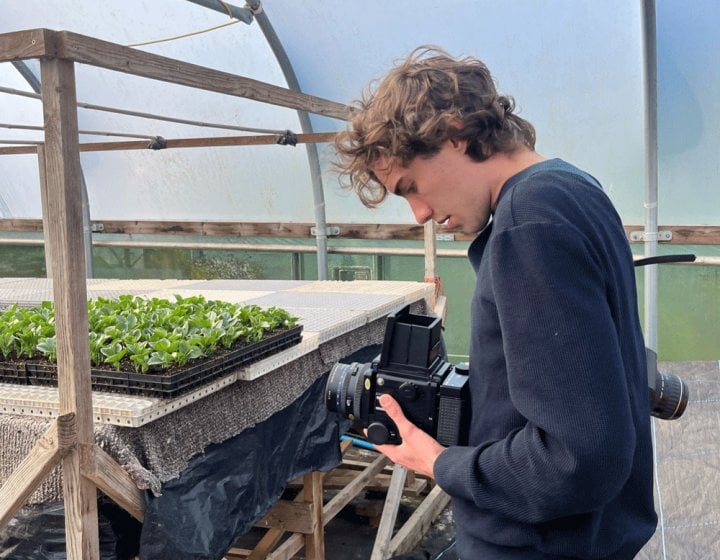
Documenting the sustainability of farming: Photography BA student Joe Day
06 May 2025
After visiting Yeo Valley Organic, The Milk Stand at Kingston Seymour Farm, and Dowstall Farm, secon...
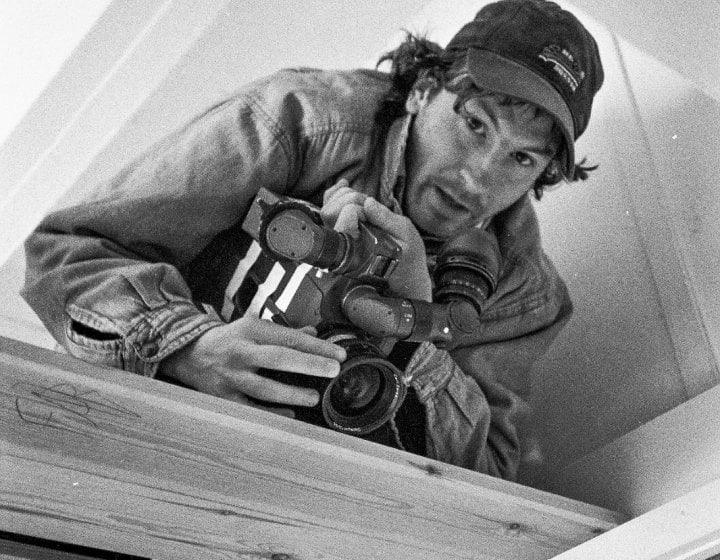
The technician and photography graduate taking music videography by storm
23 April 2025
Since graduating from Photography BA(Hons) in 2016, Charlie Fairbairn has forged an eclectic caree...
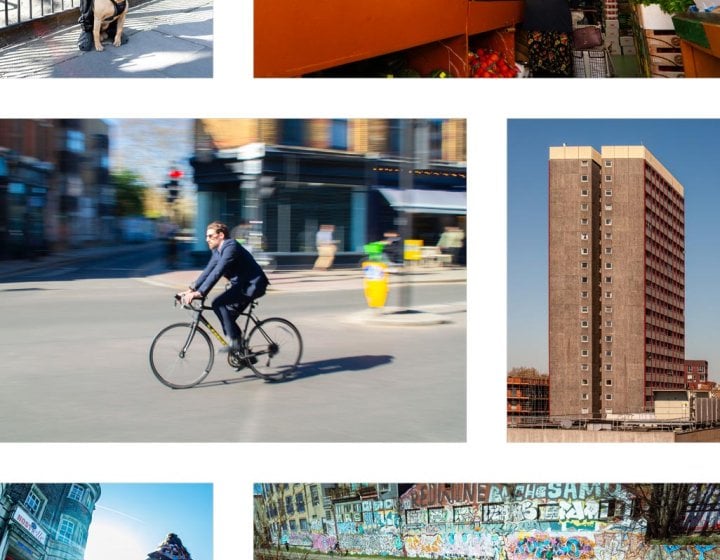
Students photograph the hidden heart of Bethnal Green in London exhibition
23 April 2025
Documentary & Editorial students had just 24 hours to document Bethnal Green's people and culture.

Image: Jennifer Forward-Hayter
Course Leader and graduate curate photography symposium at Photo|Frome
14 April 2025
Jesse Alexander, Course Leader of Photography MA (Online), and Phil Hill, a graduate of the same pro...
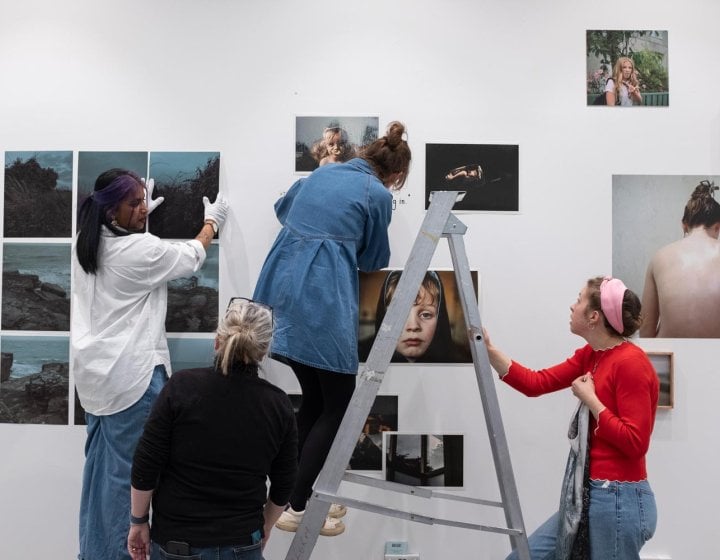
Image by Sylwia Ciszewska-Peciak
Photography graduate Dawn Rodgers exhibits at FORMAT Festival
11 April 2025
Dawn Rodgers has recently showcased her work as part of the renowned East Meets West Masterclass Pro...
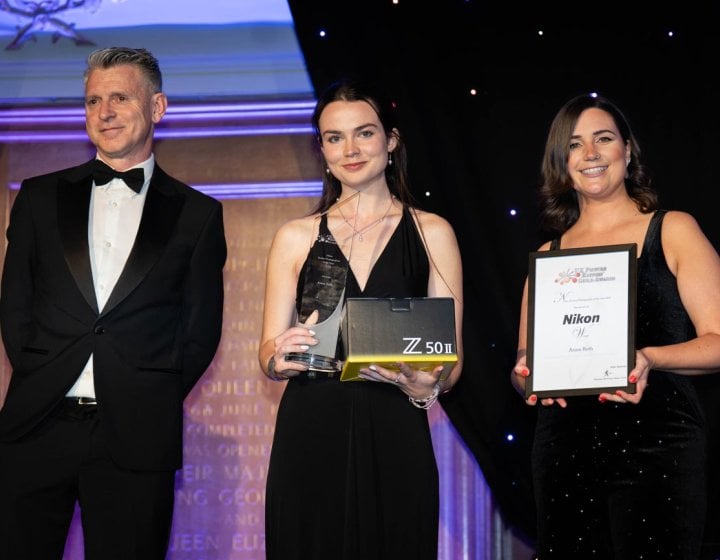
Falmouth Student Anna Roth Wins Nikon Student Photographer of the Year
08 April 2025
Third-year Press & Editorial Photography student Anna Roth has been named Nikon Student Photographer...
Connect on Instagram
Learning and support
This practice-based accelerated online degree is underpinned by rich online resources, workshops and video-based tuition. We offer a truly inclusive, conscious and multidisciplinary syllabus designed to meet the demands of photography within and beyond the creative industries.
What sort of activities will I do?
The weight of your academic teaching will take place through recorded learning content from your core academic team and practicing professionals in the creative industry. You will have a weekly learning activity where you can connect with your fellow students and staff for stimulating discussions and feedback. You will also receive technical inductions from pre-recorded videos and resources which you can refine and enquire about during your learning activities.
You will be joining a supportive and diverse course community in which you will develop your unique creative practice through inquiry-based collective learning fostering responses to challenges and connection opportunities in your own communities and contexts.
What will my study hours be?
Based on the total learning time for the accelerated online courses, an average study week for full-time undergraduate students can be up to 50 hours, and for part-time students, can be up to 33 hours. As our online courses are intended to be flexible the actual time required to study will vary based on the level of study, the module week, and individual learning pace.
What does accelerated study mean?
An accelerated degree condenses your degree modules into two years on the full-time route, or three years on the part-time route. This means you'll be working across three study blocks per year, instead of two, including through the summer. Typically, there is a break of around two weeks between submitting your final assignment for each module and the start of the next study block. You will also get breaks on public holidays, for around two weeks at Easter and for around three weeks in December.
This BA(Hons) Photography online degree employs a variety of assessment strategies over the course of the year. These include the submission of portfolios of practical work, presentations, verbal reports and a final major project.
Your summative (final) assessments occur at the end of each module, usually at the end of the study block whereas you may have interim formative assessments part way through a module as well. These assessments help ensure that you remain on track with your work.
You will receive continuous written and/or verbal feedback on all your work throughout the year. At the end of the module, you will receive detailed feedback in written form.
You'll be able to check in with your online tutor to discuss your progress and ask any questions you have about your course.
- Dedicated easy-to-use virtual learning environment (VLE)
- Accessible online audio / visual content
- A Student Advisor to support you throughout your studies and access to our Student Support Services
- Access to our Employability Service
- 24/7 access to Falmouth's extensive online library of contextual books, journals and resources
- Access to online software tutorials at LinkedIn Learning
- Students' Union community
- Optional in-person events
- Invitation to attend alumni events
Although online students don't have access to on-campus facilities as part of the course, you can hire equipment and access facilities by paying a charge. Find out more about availability and prices here.
Your online study setup
To get the most out of your online studies with Falmouth, we recommend using a desktop or laptop computer with reliable internet access. This will enable you to fully experience our Virtual Learning Environment, which houses your course material, module videos and webinar recordings, discussion forums and more. Please note while a mobile phone or tablet can support you in your studies, they are not suitable as your primary means of engagement.
If you have any questions, our friendly course advisors are here to help.
Meet the team
Falmouth’s Institue of Photography has global connectivity to a broad range of photographic practitioners. This connectivity provides essential networking opportunities for our students and graduates and helps inform and shape our curriculum.
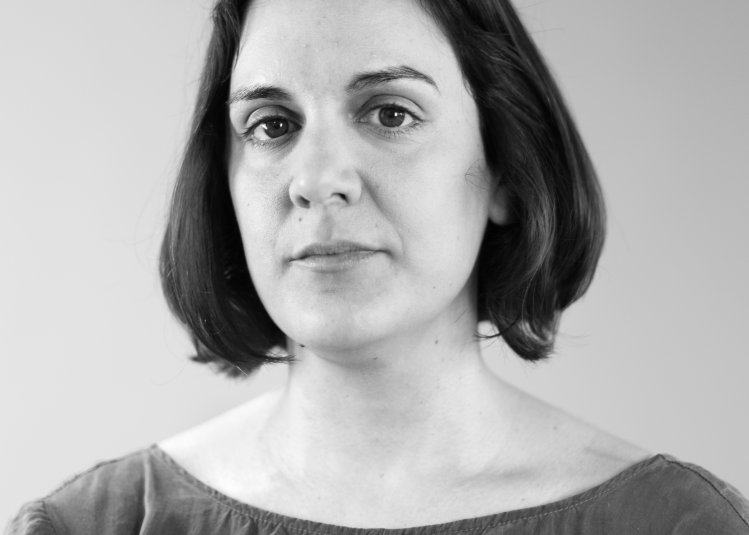
Dr Catarina Fontoura
Course Leader, Photography BA(Hons) (Online)
Catarina Fontoura is an artist, educator and writer. She has submitted her PhD thesis in History of ...
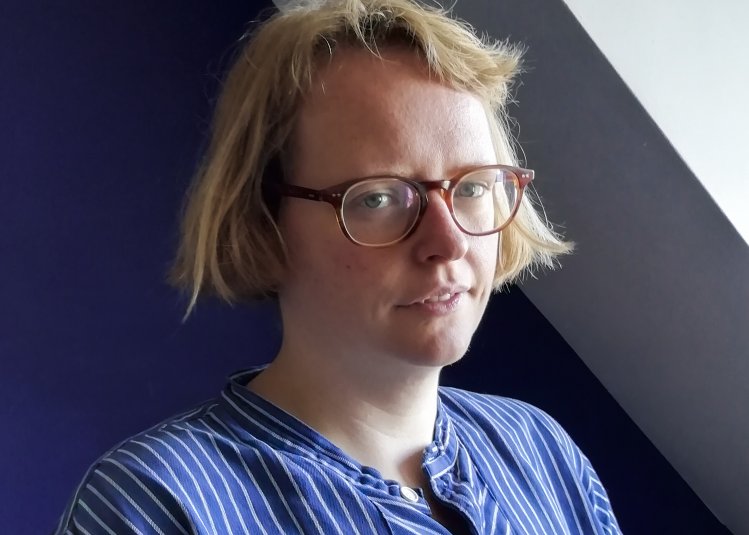
Clare Bottomley
Lecturer & Module Leader
Clare Bottomley is an artist, educator, and early career researcher, originally from Gloucester UK, ...
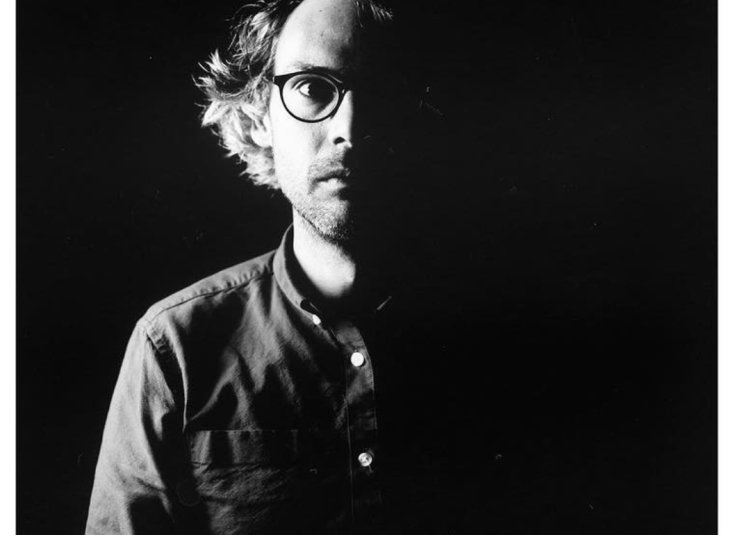
Oliver Udy
Head of Photography
Oliver Udy is a photographer, publisher and general facilitator of things.Udy joined Falmouth Univer...
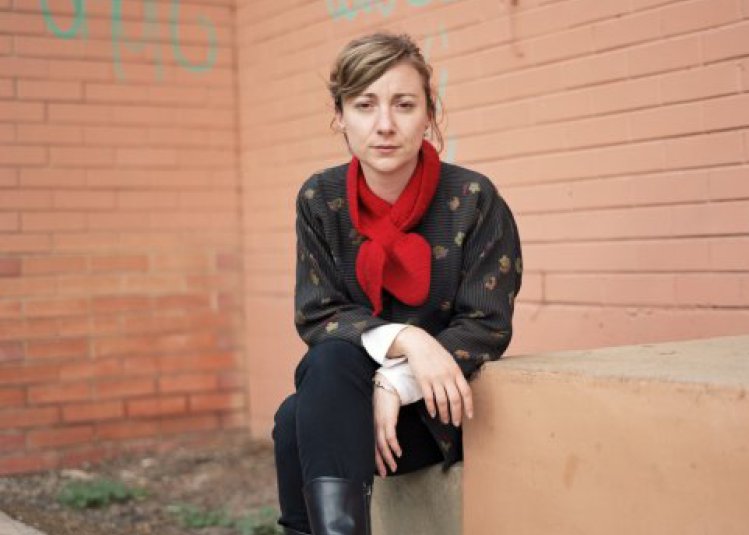
Georgia Metaxas
Lecturer & Module Leader, MA Photography (Online)
Georgia Metaxas is an artist and educator based in London, she is the Module Leader for Sustainable ...

Andrew Hilling
Lecturer, BA(Hons) Photography
After beginning to study BA Philosophy at the University of Reading, I moved back to the visual arts...
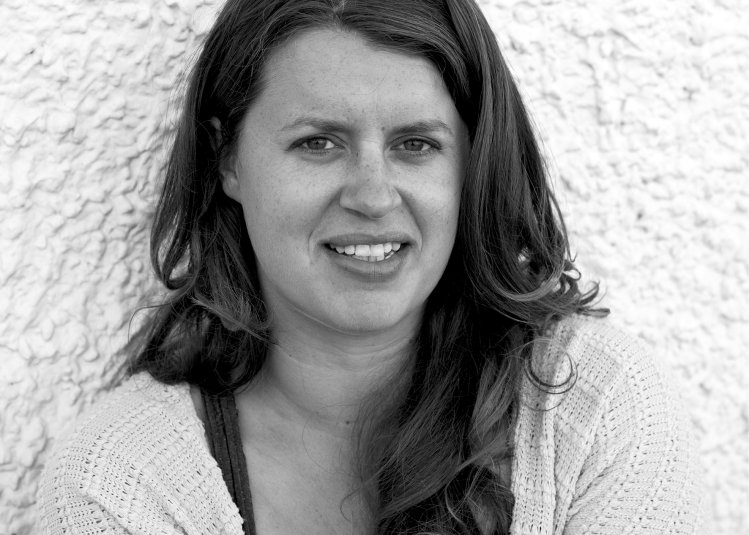
Celine Marchbank
Lecturer, Photography BA(Hons) (Online)
Celine Marchbank is a British photographic artist based in London. Her practice explores the beauty ...

Kathryn Sainsbury-Wilkes
Stores Assistant
After growing up in Birmingham, Kathryn relocated to Cornwall in 2018 in order to study Marine and N...

Meet course leader Dr Catarina Fontoura
We chatted to Catarina about her early forays into photography, her passion for creating for good, and why she is excited to lead this unique course.
Read moreSome members of staff only teach on specific modules, and your course might not feature every staff member who teaches on the course.
Careers
As a BA(Hons) Photography (Online) graduate you could become:
- Self Employed Photographer/Videographer
- Digital Assistant
- Photoshoot Producer
- Picture Editor
- Digital Archivist (Photo Libraries/Museum sector)
- Curator
- Social Media Strategist
- Digital Content Editor
- Multimedia Designer
Further Study options include:
- Postgraduate study within photography and related disciplines, or education
- PhD and research degrees
How to apply
Apply
You have the option to apply via UCAS or directly with us, depending on your education and experience. Find out more about ways to apply.
UCAS codes
You can apply for the September 2026 full-time route through UCAS using:
- University code: F33
- Course code: W64F (full-time)
| Course route | Course start | Apply now |
|---|---|---|
| Full-time | September 2026 | |
| Part-time | September 2026 | Apply directly |

Application advice & interview information
Go to ToolkitThe application deadline for this course is 7 September 2026. The academic start date is 14 September 2026*.
*Virtual Welcome Week begins the week before the academic start date. During this time, our Student Advisor team will host Welcome Webinars and be in touch with practical information on how to study online.
We consider all applications on their own individual merit and potential.
Our diverse community is creative, innovative and entrepreneurial. We recognise that these qualities aren’t always shown in academic grades alone. That’s why, while many of our applicants achieve high academic grades, we also welcome those who can demonstrate their potential through an exceptional portfolio or performance.
We welcome applications from all subject backgrounds, whether you’ve specialised in STEM, the arts or humanities. Find out more about our Entry Requirements here.
Course routes & entry requirements
BA/BSc(Hons) degree: minimum 64 UCAS Tariff points
Check how many points your qualifications are worth
Portfolio
Some of our online undergraduate degrees require you to create and submit a digital portfolio as part of the application process.
Check our portfolio advice pages for more information
Applying without UCAS points
We'll welcome your application if you have formal or 'certified' learning (such as training courses not run by universities or colleges) and learning from work experience or self-study. This is called Accreditation of Prior Learning (APL), and should have been gained within the last five years, and be equivalent to the learning outcomes of our minimum entry qualifications. Find out more about APL.
At Falmouth, we'll consider the equivalency of your specific qualifications against our entry requirements and support you through your application journey.
View our International Entry Requirements
Language requirements
For applicants whose first language is English we require you to have or be working towards GCSE English Language Grade 4 (C), or equivalent.
If English is not your first language you will need to meet the same standard which is equivalent to the IELTS Academic 6.0 overall score, with at least 5.5 in Reading, Writing, Speaking and Listening. We accept a range of in country equivalencies and approved tests.
If you need a student visa to study in the UK, you may need to take a recognised language test. You can read our English Language Requirements for more information.
For more information about equivalent international qualifications or English language requirements please contact our friendly Course Advisors.
What we're looking for
- Someone with aspirations to use photography for positive change and to reshape the creative industries
- Someone who is ambitious, entrepreneurial and wants to develop their own visual language
- Someone looking to accelerate their current career within a supportive, collaborative community
Fees, costs & funding
Tuition fees
| Annual tuition fee | Student |
|---|---|
| £10,400 per year | 2 years accelerated full-time |
| £6,935 per year | 3 years accelerated part-time |
| Annual tuition fee | Student |
|---|---|
| £10,400 per year | 2 years accelerated full-time |
| £6,935 per year | 3 years accelerated part-time |
Tuition fees for September 2027 will be confirmed in summer 2026.
Tuition fees are set annually and are subject to review each year. The University may therefore raise tuition fees in the second or subsequent years of a course, in line with inflation and/or the maximum permitted by law or Government policy. Students will be notified of any changes as soon as possible.
The figures above don't include accommodation and living costs
What funding can I get?
Funding for online study is different to on-campus study. You'll find information about both tuition fees and how you can fund your online study on this page.
Explore funding options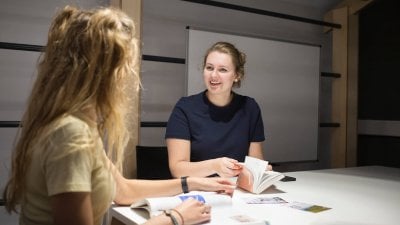
Typical course costs
One-off costs
You will need a DSLR or Mirrorless camera system. There are lots of options for buying these, including second hand cameras. We would recommend a camera that has full manual controls and the ability to produce still and moving images, e.g.:
- Canon EOS DSLR or EOS R series
- Nikon DSLR or Z Series
- Sony A Series (A7 or A9)
- Fuji X series
NB: Each of these will need two lens – we would recommend a zoom lens (24-70mm or similar) and a prime lens (50mm equivalent).
You will need to purchase a laptop/desktop computer. It is an essential piece of equipment that you will need right from the start of the course. Our students use both PCs and Macs.
When considering your purchase of a laptop, the most important things to look out for is the CPU/RAM/graphics card, as you will be using production software that needs a large amount of power. We recommend one with as fast a processor as you can afford (8GB of RAM minimum) and a reasonably sized screen (13" minimum, 15" is optimum), plus the following minimum computer specifications:
Windows:
- Windows 10
- At least an i7 processor
- No less than 8-16GB Ram
- Graphics Card (nVidia 1080 minimum, not Intel Iris integrated graphics) with at least 2GB
- 256GB hard drive space minimum
- 1920 x 1080 display resolution or higher (most displays offer a higher resolution than this)
Apple MacBook Pro:
- Mac OS 10.15 or newer
- At least an i7 processor
- No less than 8-16GB Ram
- Graphics Card
- 256GB hard drive space minimum
- 1920 x 1080 display resolution or higher (most displays offer a higher resolution than this)
Other digital equipment/software:
- 1TB hard drive (approx. £50)
- Wireless or Bluetooth mouse (approx. £15)
Recurring annual costs
- £100-£200 - Studio kit (outlined in your Welcome Letter)
- £100-£200 - Recommended reading throughout course
- Face-to-face events (optional): £100-£800 - As an online student you will be given the opportunity to attend up to two events per academic year to meet your classmates and tutors in person. Dates and location of the events will vary, but previous trips have include London, New York, Amsterdam, Paris and Bristol. There will also be a face-to-face event in Falmouth once per year.
- Adobe Creative Cloud: You will need access to Adobe Creative Cloud. You may be eligible for discounted licenses through Adobe's education pricing and Falmouth University seeks to provide further discounts when possible. If any discounts are available, we will communicate these to you. For more information please visit Adobe Creative Cloud.
Course equipment and costs
As this Photography degree course is studied wholly online, as well as a computer or laptop, you will need a reliable broadband connection. You may wish to investigate the cost of a broadband plug-in dongle if you travel a lot or are worried about your internet usage or connection.
You will also need the Adobe Creative Cloud suite. We anticipate that there will be a discounted annual subscription available through the University before the start of your course. We will confirm this with you as soon as possible.
You will need a camera, preferably a DSLR digital camera and a tripod. The cost for these can vary, depending on brand and models. You will need SD memory cards and an external hard drive to back up all your work. We will be making recommendations during the course for accessories and materials you can add to your kit, such a lighting and digital editing tools, these are optional, however.
From September you will have experts to help you make decisions about kit and offering technical advice and support.
Additional costs
You will also need to consider ongoing printing costs for projects and experimentation undertaken, which can be between approximately £100 and £200. This will be less should you work from analogue to digital or with film or animation. This cost is down to how you finish and produce your work and the production services you use.
Funding
For information about funding available, please visit our student funding pages.
Ask a student
What better way to find out about life at Falmouth University than by asking our current students?
From course details and academic support, to the social scene and settling in, our students are ready and available to answer any questions you might have. Simply set up your account, send them a question and they'll get back to you within 24 hours.
Similar courses

Photography BA(Hons)
On this dynamic course, you’ll explore the world of contemporary photography and develop a unique ...
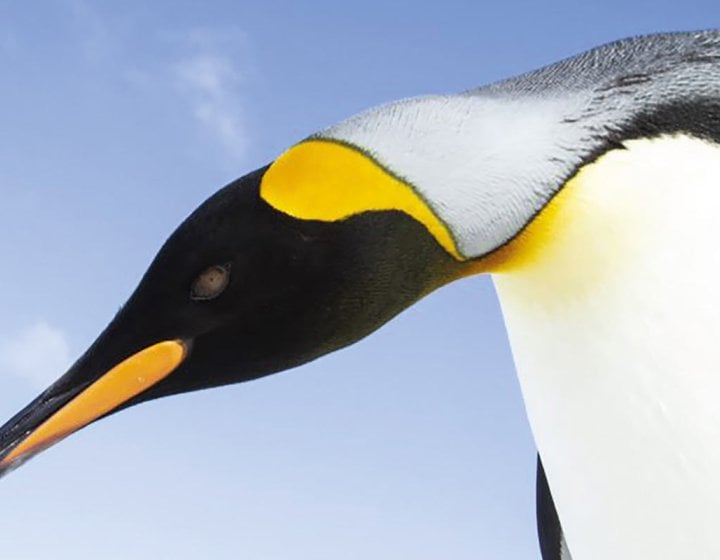
Marine & Natural History Photography BA(Hons)
Harness your passion for photography and filmmaking to inspire audiences about nature and the enviro...
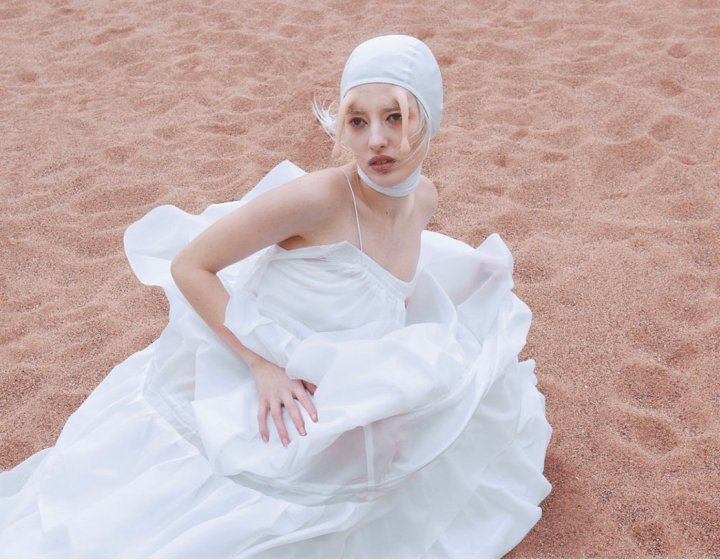
Fashion Photography BA(Hons)
Develop your unique artistic voice and springboard into the industry as an innovative fashion photog...

Documentary & Editorial Photography BA(Hons)
On this fast-paced degree, you’ll learn to use the power of photography to communicate with a glob...

Work by Hannah Mittelstaedt
Commercial Photography BA(Hons)
From creating photographs and films for high-end advertising and marketing campaigns to producing vi...
Speak to an advisor
Do you have questions about the course or studying online with Falmouth? Fill in our simple online form and we'll get in touch to support your application journey.
Submit form